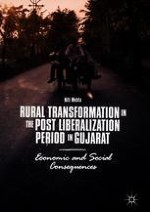2018 | OriginalPaper | Buchkapitel
5. Changing Socio-Economic Profile of Urbanised Villages (Census Towns) in Gujarat
verfasst von : Niti Mehta
Erschienen in: Rural Transformation in the Post Liberalization Period in Gujarat
Verlag: Springer Singapore
Aktivieren Sie unsere intelligente Suche, um passende Fachinhalte oder Patente zu finden.
Wählen Sie Textabschnitte aus um mit Künstlicher Intelligenz passenden Patente zu finden. powered by
Markieren Sie Textabschnitte, um KI-gestützt weitere passende Inhalte zu finden. powered by
